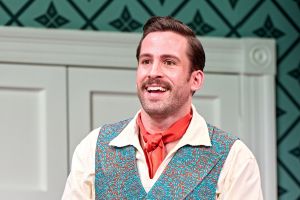Brief Encounter With … Rupert Goold
Fresh from his three Best Director gongs for Macbeth, Rupert Goold’s new production is the UK premiere of American Stephen Adly Guirgis’ The Last Days of Judas Iscariot, just opened at the Almeida Theatre.
THE GOOLD FILE
As artistic director of Northampton’s Royal and Derngate, Rupert Goold was credited with putting the regional theatre on the map nationally. In 2005, he was appointed artistic director of Oxford Stage Company, which he relaunched as Headlong Theatre, with acclaimed productions including Rough Crossings, Faustus, Paradise Lost and Angels in America.
Goold’s freelance credits have included The Tempest starring Patrick Stewart for the Royal Shakespeare Company, The Glass Menagerie with Jessica Lange in the West End and Macbeth, starring Patrick Stewart again and Goold’s wife Kate Fleetwood, which, after success in Chichester, the West End and New York, is now transferring to Broadway. Amongst its many awards to date, Macbeth won Goold Best Director gongs at this year’s Evening Standard, Critics’ Circle and Laurence Olivier Awards.
Goold’s future productions include two more Headlong productions – a new adaptation of Pirandello’s Six Characters in Search of an Author, opening at Chichester in July, and King Lear, with Pete Postlethwaite in the title role, opening in Liverpool in November – and opening at the West End’s Theatre Royal Drury Lane next January, Cameron Mackintosh’s revival of Oliver!, which will mark the director’s musical debut.
You’ve won a hat trick of Best Director awards for Macbeth. What does that mean to you?
Winning those awards doesn’t mean I’m actually the “best director”. That’s crazy: Simon McBurney is a genius and he didn’t even get nominated. But, yes, it’s great to win. I know it’s a high watermark in my career in terms of recognition. And it makes me feel that I can take more risks now – not that my work is particularly safe. In early reviews, I was often accused of being “gimmicky”. It can be difficult to take risks because we reward conservatism. But if I hadn’t taken those risks when I was starting out and learnt from them – including, admittedly, some failures – I wouldn’t have gone anywhere near doing what we did with Macbeth.
Why do you say conservatism is rewarded?
Because for 100 years now theatre has been in fear of dying, a lot of classical theatre champions worry that Shaw, Rattigan, Coward or Shakespeare will somehow be betrayed if people muck around with them. It may not always work but it’s totally valid to try something new, and yet there’s so much indignation.
But do classics need to be reinvented?
My thinking came from spending a lot of time in regional theatre, where the assumption that it’s less sophisticated is in some ways true because audiences are less theatre literate. When I was running Northampton, I felt we had to go the extra mile to get people interested. With Shakespeare, I always try to get in touch with what shocked in the Jacobean period and find a correlative in the modern world. Having done a lot of research withMacbeth, it’s clear that what the witches represented in Shakespeare’s day was genuinely terrifying: some kind of fusion of what we’d now associate with the war on terror but also the apocalypse. You’re not going to get that sense if you just show three crones wearing false noses.
Is the New Directions Award, launched by Headlong and the Gate Theatre, part of that thinking?
That’s come out of the work I’ve done with Ben Power, in trying to make a radical intervention into an existing text, like we did with Faustus. Architecturally, it’s the equivalent of the Louvre, where you have a period building with this glass pyramid in the middle of it. We wanted to see what theatre imaginations might do with the classical European repertoire, especially in smaller spaces like the Gate. We’re really excited by what the winner, Chris Goode, is doing with …Three Sisters.
At the same time, you’ve increased your Headlong target for producing entirely new work to 70 percent of your output.
We found that really good writers – like Richard Bean, Lucy Prebble and Anthony Neilson – were keen to work with us because what we can offer is unique: making a production totally bespoke to the needs of the text. That might be a ten-week tour, a one-off shot in a studio or a production at a major subsidised house. None of the producing theatres can offer that because they’re always going to be stuck in their own building. And, because we don’t have the overheads of staffing a building, we can be more engaged dramaturgically.
Why did The Last Days of Judas Iscariot appeal?
I saw Stephen’s play Jesus Hopped the A Train in London and have followed all of his work. Up until this, it was very street, like early Scorsese. When I read Judas, I was surprised by this mad theatrical fantasy. It felt very Headlong, similar in form and subject to Angels in America, Paradise Lost and Faustus: big plays about the death of faith in a secular age. So we optioned it without knowing where we’d do it and then the Almeida liked it too so here we are.
What can audiences expect with Judas?
They can expect a kind of Seventies-style legal drama with a lot of wild anarchic comedy, some of it very David Mamet-like, some almost Naked Gun-like. But they can also expect to be very moved. It’s got everything – including, honestly, the best cast I’ve ever worked with. In addition to established names like Douglas Henshall, we have actors who are going to be huge stars in ten years’ time.
What’s the best advice you’ve ever received?
As a director, you should just think in terms of three pieces of work: the one you’re doing now, the one you’re going to do next and the one you’d like to do at some point. That way you stay focused and stop worrying whether you’re going to run the National when you’re 60. My first job was assisting Sam Mendes, who was only six years older than me. After I left the Donmar, I thought I was doing quite well when I had my first professional production on, but there was Sam with a show at the National. When I had my first national tour, Sam was winning an Oscar. I kept thinking, I’ve got to get on and achieve more, like Sam. Fortunately, you hit your thirties and you relax a bit.
So what’s the future piece you’d like to do?
A new musical, maybe even with Headlong. I went to see Spring Awakening on Broadway. It made me remember how exhilarating musical theatre can be: it’s still a living breathing art form.
In your Olivier acceptance speech, you thanked William Shakespeare. How has he shaped your life?
My first vivid theatre memory was Antony Sher’s Richard III. The first school play I acted in was Romeo and Juliet. My first directing experience was with Othello. I made my best friends doing Twelfth Night at university. I met my wife directing her as Juliet at Greenwich. Really, it’s incredible how Shakespeare is at the centre of all my major networks: family, friendships, career, education. And the more time I spend with him, the more I realise that Shakespeare is my argument for God: for a genius as sublime as his to exist, there must be something more than mortal.
The Last Days of Judas Iscariot opened on 3 April 2008 (previews from 28 March) at the Almeida Theatre, where it continues until 10 May 2008.












